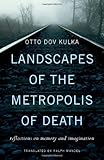Landscapes of the Metropolis of Death : Reflections on Memory and Imagination / Otto Dov Kulka.
Material type: TextPublisher: Cambridge, MA : Harvard University Press, [2013]Copyright date: ©2013Description: 1 online resource (139 p.) : 48 halftonesContent type:
TextPublisher: Cambridge, MA : Harvard University Press, [2013]Copyright date: ©2013Description: 1 online resource (139 p.) : 48 halftonesContent type: - 9780674072893
- 9780674075092
- 940.53/18
- D804.3
- online - DeGruyter
| Item type | Current library | Call number | URL | Status | Notes | Barcode | |
|---|---|---|---|---|---|---|---|
 eBook
eBook
|
Biblioteca "Angelicum" Pont. Univ. S.Tommaso d'Aquino Nuvola online | online - DeGruyter (Browse shelf(Opens below)) | Online access | Not for loan (Accesso limitato) | Accesso per gli utenti autorizzati / Access for authorized users | (dgr)9780674075092 |
Frontmatter -- Contents -- Acknowledgements -- Introduction -- Landscapes of the Metropolis of Death -- 1. A Prologue that Could Also Be an Epilogue -- 2. Between Theresienstadt and Auschwitz -- 3. Final Liquidation of the ‘Family Camp’ -- 4. Autumn 1944: Auschwitz – Ghostly Metropolis -- 5. Observations and Perplexities about Scenes in the Memory -- 6. Three Poems from the Brink of the Gas Chambers -- 7. Journey to the Satellite City of the Metropolis of Death -- 8. Landscapes of a Private Mythology -- 9. Rivers which Cannot be Crossed and the ‘Gate of the Law’ -- 10. In Search of History and Memory -- Three Chapters from the Diaries -- 11. Dream: Jewish Prague and the Great Death -- 12. Doctor Mengele Frozen in Time -- 13. God’s Grieving -- Appendix: Ghetto in an Annihilation Camp: Jewish Social History in the Holocaust Period and its Ultimate Limits -- List of Illustrations -- Notes
restricted access online access with authorization star
http://purl.org/coar/access_right/c_16ec
Historian Otto Dov Kulka has dedicated his life to studying and writing about Nazism and the Holocaust. Until now he has always set to one side his personal experiences as a child inmate at Auschwitz. Breaking years of silence, Kulka brings together the personal and historical, in a devastating, at times poetic, account of the concentration camps and the private mythology one man constructed around his experiences. Auschwitz is for the author a vast repository of images, memories, and reveries: “the Metropolis of Death” over which rules the immutable Law of Death. Between 1991 and 2001, Kulka made audio recordings of these memories as they welled up, and in Landscapes of the Metropolis of Death he sifts through these fragments, attempting to make sense of them. He describes the Family Camp’s children’s choir in which he and others performed “Ode to Joy” within yards of the crematoria, his final, indelible parting from his mother when the camp was liquidated, and the “black stains” along the roadside during the winter death march. Amidst so much death Kulka finds moments of haunting, almost unbearable beauty (for beauty, too, Kulka says, is an inescapable law). As the author maps his interior world, readers gain a new sense of what it was to experience the Shoah from inside the camps—both at the time, and long afterward. Landscapes of the Metropolis of Death is a unique and powerful experiment in how one man has tried to understand his past, and our shared history.
Mode of access: Internet via World Wide Web.
In English.
Description based on online resource; title from PDF title page (publisher's Web site, viewed 26. Apr 2024)


